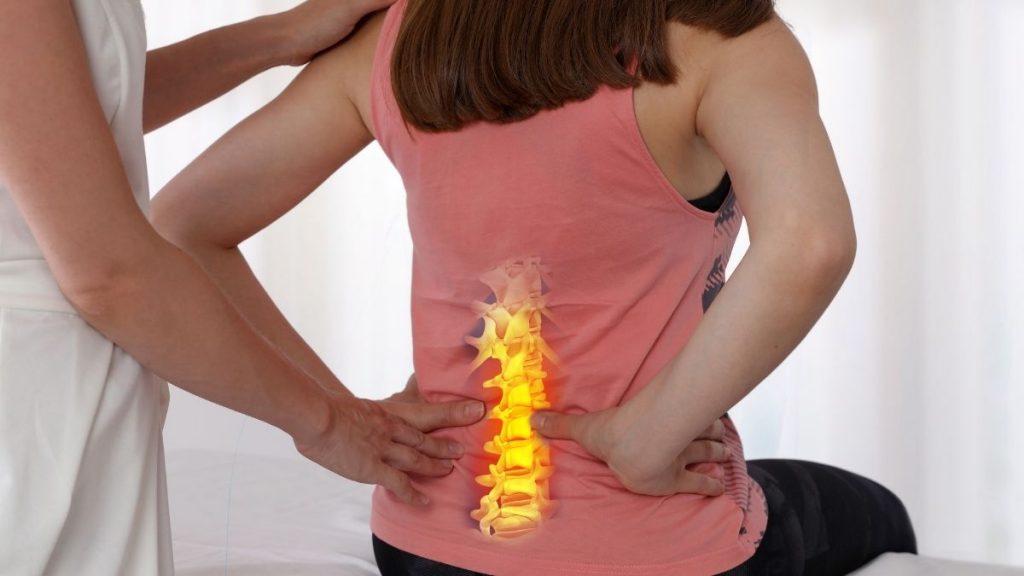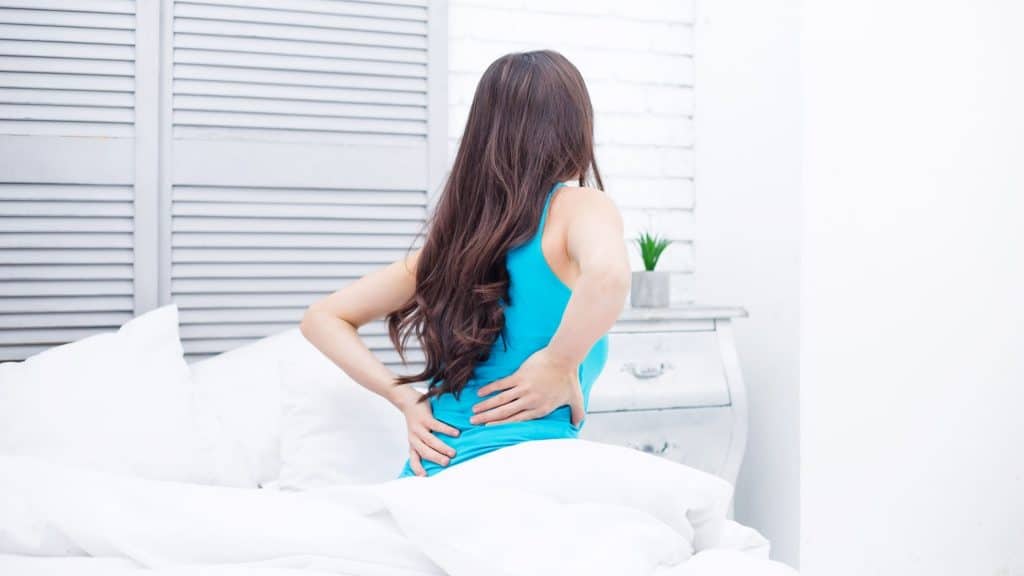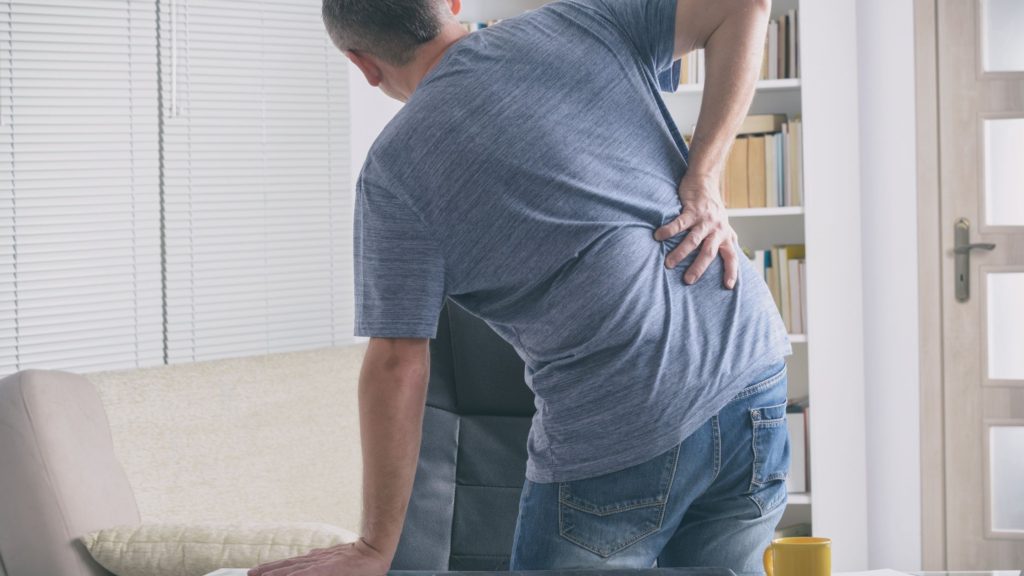Last updated on April 29th, 2025 at 11:10 am
Back pain is common among female homemakers who engage in a large number of hours of housework, involving them in repetitive hand movements, bending, kneeling and squatting1.
In this article, we will explore the causes of back pain related to household work and discuss practical modifications to help alleviate this discomfort.
We will focus on the experiences of a woman who faces back pain due to her daily household tasks and demonstrate how minor adjustments can make a big difference.
Identifying the Sources of Back Pain
The first step in addressing back pain is understanding its origins. In our clinic, when dealing with lower back pain, I can attribute most of the women with back pain to various household tasks they perform, including sweeping, cleaning, and washing dishes. A research paper2 truly said that a full-time homemaker is a worker who can not go home and relax.
This is because most household work often requires them to work in different positions, bend over, lift heavy items, and more. These activities put excess pressure and stress on the lower back, leading to lower back pain.
Why does doing the dishes hurt my back and what to do about it
The kitchen is one of the main areas where our women experience back pain. Many women spend a significant amount of time here, performing tasks such as washing dishes and cooking.
These activities often involve bending over the sink or standing for extended periods, which can worsen lower back pain cases such lumbar disc hernia and sciatica.
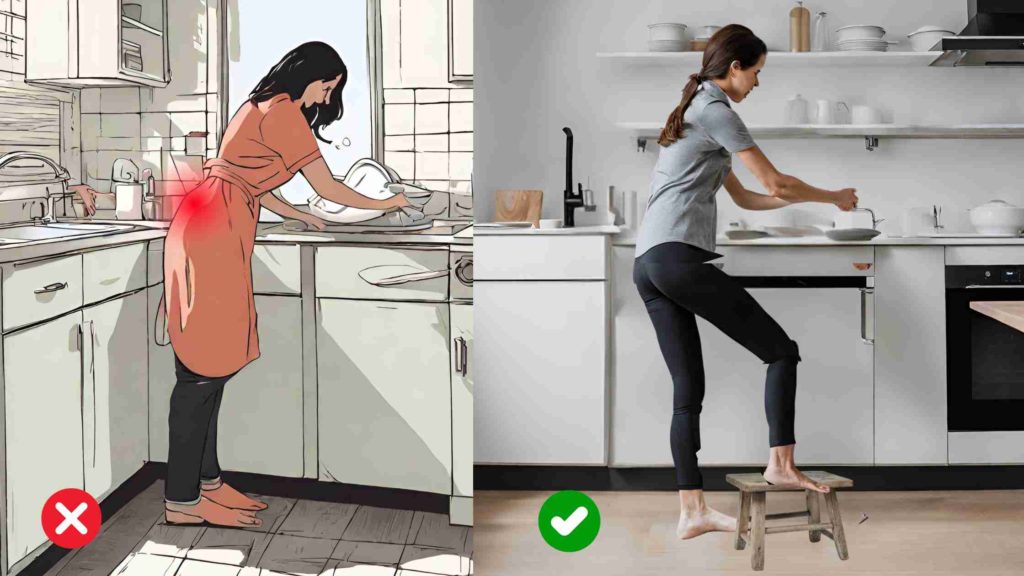
We recommend making minor yet effective modifications to address lower back pain while working in the kitchen:
- For instance, when washing dishes, consider using a stool to support one leg on it. This simple adjustment reduces strain on the lower back and can significantly alleviate discomfort.
- Similarly, when cooking, maintain an upright posture with one hand on your hip while using the other to perform tasks. These changes can make a noticeable difference in your comfort level.
- In addition to this, it’s essential to take regular breaks and stretch your body to relax tense muscles. A short pause to walk or perform stretching exercises can help reduce accumulated tension in the back.
- Organising your kitchen so that the utensils and tools are within reach and at an appropriate height would be a better idea. This would avoid unnecessary movements and uncomfortable postures.
With attention and care, you can minimize back pain while working in the kitchen and enjoy your everyday activities more.
Avoid lower back pain after cleaning the house
Sweeping and cleaning of the house is simply unavoidable. However, when we have back pain, we should be mindful of our posture and body mechanics while performing these tasks.
Performing these tasks in the wrong posture can cause back pain1.
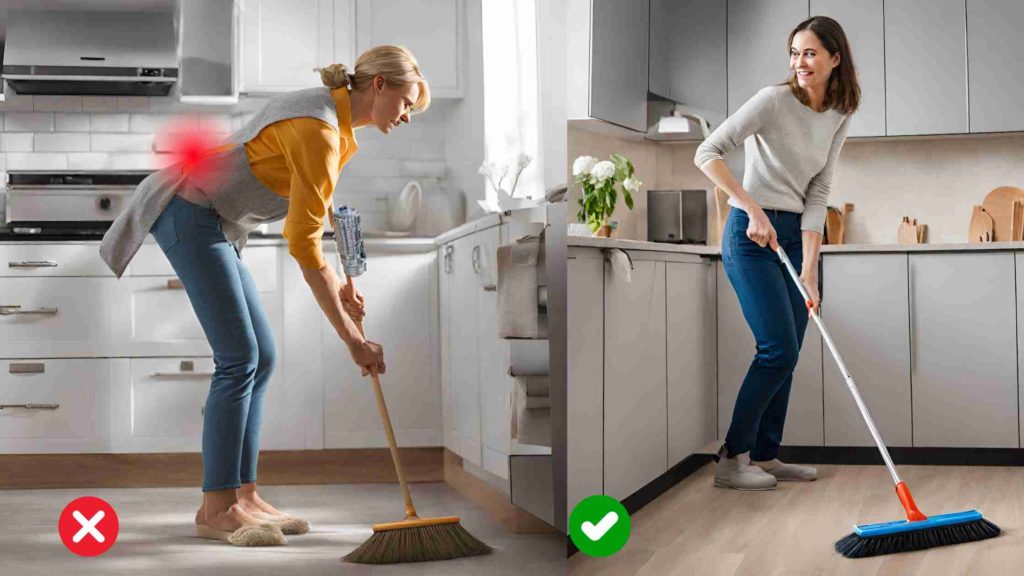
As you can see in the figure, sweeping or wiping in a bending-over position puts excessive pressure on the lower back, leading to muscle fatigue and potential injuries.
To prevent this, a simple modification can make the sweeping process more ergonomic and back-friendly.
- Consider attaching a longer handle to your broom or mop, allowing you to maintain an upright position while sweeping. This simple yet effective modification will help minimise the need to bend over excessively, reducing the strain on your back and promoting better posture during the cleaning process.
- You can find broom or mop handles with adjustable heights or purchase longer handles separately and attach them to your existing cleaning tools. Implementing this change is relatively easy and cost-effective.
By maintaining proper posture and using ergonomic tools, you can turn household chores into a more comfortable and enjoyable experience, ensuring both a clean home and a healthy back.
So keep those brooms and mops handy, but don’t forget to prioritize your body’s needs. Happy cleaning!
Prevent back pain with housework like washing clothes.
Washing clothes or laundry is a chore that often requires much physical effort, especially washing clothes by hand. We commonly wash clothes by hand in a squatting position or on a low, low-height stool, almost equal to squatting.
This can cause a serious aggravation of low back pain related to the lumbar slipped disc.
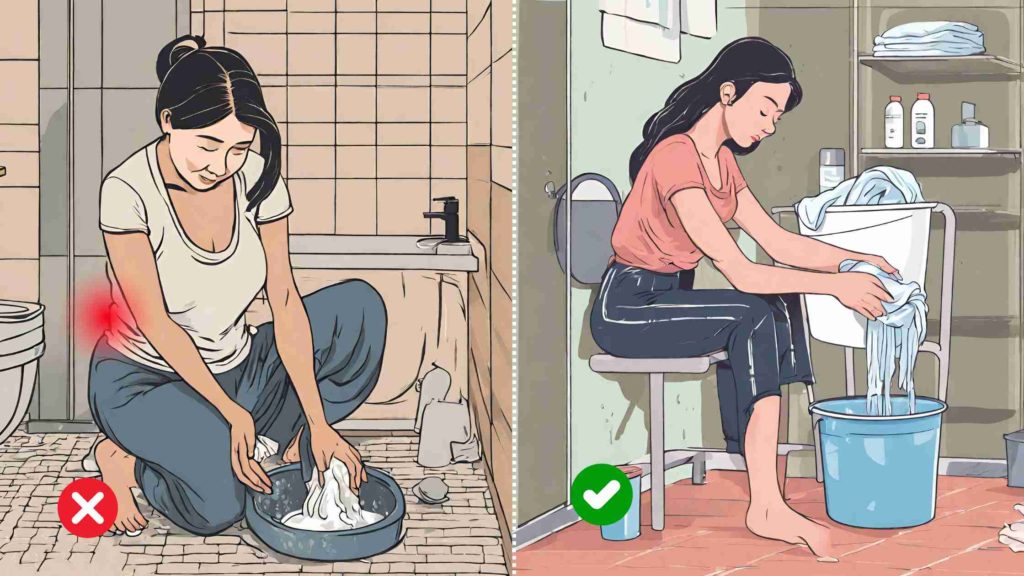
- Individuals can significantly reduce the strain on their backs by using a chair while washing clothes. As you can see in the figure above, sit on a normal-height chair and then transfer the task burden from the lumbar area to the chair.
- This significantly reduces the stress on the lower back, allowing for a more comfortable and pain-free experience. This small adjustment in posture can make a world of difference, especially for those who regularly wash clothes without the aid of a washing machine.
So, next time you tackle laundry without a washing machine, consider the benefits of using a chair and make the task a little easier on your body and mind.
Other tips to consider
Experiencing pain from household chores is a common issue, particularly for women who often shoulder a significant workload at home. The daily routines and repetitive motions involved in cleaning, cooking, and laundry can take a toll on the body, specifically the lower back.
Following the simple modification discussed above can significantly reduce the load and strain on your lower back. Before I end this article, let me leave you with some other tips that can significantly positively impact your lower back pain.
Nevertheless, there’s good news! By making small adjustments to how these tasks are performed, you can minimize the risk of lower back pain. Let’s explore a few practical examples together.
- Proper Lifting Techniques: One common cause of back pain is improper lifting of heavy objects. Whether you’re rearranging furniture or carrying groceries, it’s crucial to use proper lifting techniques. Remember to bend from your knees, keep your back straight, and engage your leg muscles to lift the load. When possible, consider enlisting the help of others or using assistive devices like hand trucks or dollies.
- Alternate Standing and Sitting: If your chores involve long periods of standing, try to break them up by incorporating periods of sitting. Resting your feet and giving your back a break can help prevent muscle fatigue and discomfort. A height-adjustable stool or chair can relieve and make tasks like ironing or folding laundry more comfortable.
- Maintain Good Posture: Maintaining good posture is also very important for the health of your spine. Try to maintain a straight-up position while standing. Whenever possible, avoid slouching or hunching over, as this can strain your back muscles and lead to pain in the long run.
- Stretching and Strengthening Exercises: Incorporating stretching and strengthening exercises into your daily routine can significantly improve your back. Simple exercises like cat-camel stretches, hamstring stretches, and core-strengthening exercises can help build muscle strength, improve flexibility, and reduce the risk of back pain. I have discussed these exercises in detail with pictures; refer to this article, “8 Effective Physical Therapy Exercises for Lower Back Strain to Increase Work Efficiency“.
Keep Reading: How to Get Out of Bed with Sciatica Back Pain
The author is a physiotherapist who has been practising for the last 17 years. He holds a Bachelor's in Physiotherapy (BPT) from SVNIRTAR (Swami Vivekananda National Institute of Rehabilitation and Research), one of the prestigious physiotherapy schools in India.
Whatever he learns dealing with his patient, he shares it with the world through blogs and e-books. He also owns a YouTube channel, "Sunit Physiotherapist" with over 8 lakh active subscribers. Here, he shares everything he gets to learn serving the patient.


